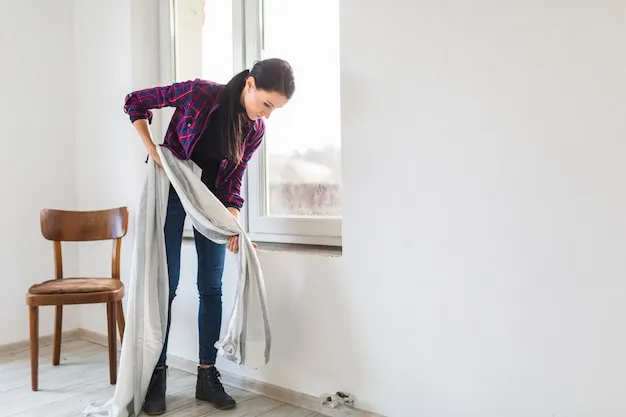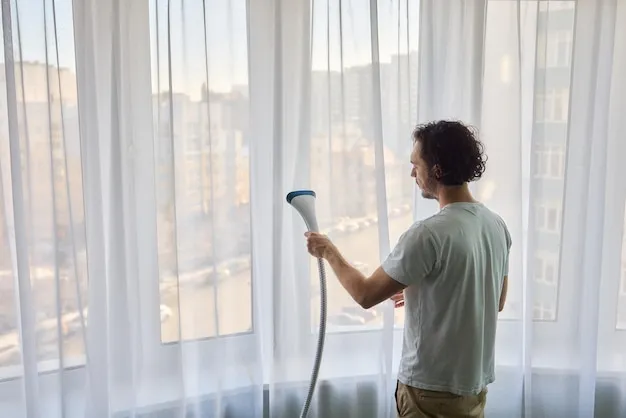Dirty Curtains, Hidden Dangers: How Neglecting Them Can Harm Your Health and Home

Many of us focus on keeping mattresses clean, washing sheets regularly, and caring for pillows, but we often forget about the importance of curtains. Although their presence is subtle, they greatly influence the cleanliness of our homes.
Dust, pollen, pet dander, smoking, and other airborne particles are trapped by dirty curtains, which can negatively affect comfort and health. These particles build up over time, reducing indoor air quality and making a home less welcoming.
Curtain cleaning is often overlooked despite its importance. Many homeowners don’t realise that skipping this easy task is a common mistake that can influence odours, allergens, and the durability of the fabric.
Why Curtains Get Dirty Faster Than You Think
Dirty curtains can harbour mould spores, bacteria, dust mites, and everyday pollutants more quickly than many realise. Particles that stick to fabric are continuously circulated by factors such as open windows, urban pollution, and central heating or cooling systems, making curtains a hidden source of dirt.
Neglected curtains can harm your health, cause allergies, and undermine overall home hygiene, underscoring the importance of routine cleaning.

Hidden Health Risks Lurking in Dirty Curtains
Dirty curtains not just affect the indoor air quality, but they also dull the look of your home. Sensitive people may experience general discomfort or allergy symptoms when dust and moisture build up. However, regular or professional cleaning keeps your area safer and healthier while preventing these problems. Here are some hidden health risks that may be lurking in dirty curtains.
Dust Mites and Allergens
Dust mites, pollen, cat hair, and other microscopic allergens are drawn to curtains, even shower curtains. These particles are a continuous source of exposure because they stick to the fabric and are discharged into the air whenever curtains are moved.
This can reduce indoor comfort and general well-being for allergy patients by causing congestion, coughing, watery eyes, and sneezing. To reduce allergy symptoms, reduce accumulation, and maintain a healthier home, routine cleaning is crucial.
Mould and Mildew Growth
Many homes in Amsterdam have high humidity, which is ideal for mould and mildew growth on curtains. Especially in restrooms or poorly ventilated spaces, moisture trapped in fabric can promote the growth of fungi that can harm the material and release offensive odours. Mould spore exposure is a major health risk since it can cause asthma triggers, respiratory disorders, and other allergy-related problems.
Curtain and upholstery cleaning service, and enough ventilation are essential to preventing these issues. See how to choose curtains for the bedroom for selecting materials that resist moisture and mildew.
Germs and Bacteria
Dirty curtains can become a haven for bacteria and germs when they come into contact with common objects, pets, or air from open windows. Over time, these microbes can increase the risk of infections spreading throughout your home and contribute to offensive smells. By using curtains that withstand heat and hiring professional curtain cleaners regularly, you can keep your living area fresher and healthier by reducing bacteria.
How Dirty Curtains Affect Your Home Environment
Dirty curtains can degrade air quality, make your house appear drab, retain offensive smells, block natural light, and deteriorate more quickly due to dust accumulation. Neglected fabric eventually loses its beauty, colour, and shape, which reduces the overall comfort and style of your room. See why drapery cleaning is so important for additional information.

Poor Air Quality
Dust, pollen, smoke particles, and other environmental pollutants are trapped by curtains when they are left unclean for extended periods. These particles are released back into the air and circulate throughout your house whenever you pull them open, brush past them, or let a breeze in through the window. This eventually starts a contamination loop that makes your indoor space heavy, stale, and challenging to maintain.
This accumulation is significantly worse in urban settings, where pollution, dust from transportation, and building debris are prevalent. Even with routine dusting and vacuuming, dirty curtains contribute to a noticeable decline in air quality, making it harder to maintain a clean, breathable living area.
Fading and Fabric Damage
The curtain fabric easily loses its smooth texture, becomes weaker, and appears prematurely worn when dust, pollutants, and grime are left on it for an extended period. When combined with continuous exposure to sunlight, the dirt acts as an abrasive, accelerating discolouration and causing patterns to appear dull and colours to fade unevenly. This accumulation shortens your curtains’ lifespan over time, causing fraying, thinning, and the need for early replacement, and affecting their beauty.
Unpleasant Odors
Smoke, cooking smells, pet odours, and excess moisture can all be trapped by dirty curtains, leaving your house smelling stale. Even if surfaces are cleaned or the space is ventilated, these smells eventually become ingrained in the fabric, making the place feel less fresh. To get rid of these trapped odours and create a fresh, welcoming environment, regular cleaning or expert care is necessary.
How Often Should You Clean Your Curtains?
Curtains should be cleaned every 3 to 6 months in most homes, especially in cities, to prevent dust, pollutants, and allergens from building up. To keep your home healthier and your curtains looking their best, a curtain and upholstery cleaning service can completely remove embedded dirt, odours, and allergy-triggering particles, even though routine vacuuming helps maintain freshness.
Professional vs. DIY Curtain Cleaning: What’s Best for You?
Although doing your own curtains cleaning may seem practical, it often leads to problems such as shrinkage, fading, fabric distortion, and improper dust or allergen removal. DIY can be risky because many delicate materials can’t handle harsh detergents or machine washing.
Professional curtain cleaners, on the other hand, use modern machinery, regulated cleaning techniques, and fabric-specific treatments that preserve texture, colour, and structure. To provide transparent pricing and simple reservation options to contact us, we can thoroughly clean large drapes, delicate sheers, and speciality textiles without causing harm.
Professional services like Love2Laundry will always produce better results if you desire thorough cleaning, long-lasting fabric care, and total peace of mind.
FAQs – Dirty Curtains, Hidden Dangers
Are blackout curtains unhealthy?
Since they block out unnecessary light, blackout curtains are actually beneficial for sleep. Just remember to open them every day to let in fresh air and sunlight.
What happens if you don’t wash curtains?
If you don’t wash your curtains, dust, allergens, and odours build up over time. This can lead to poor air quality and make your home feel less fresh.
How to keep curtains dust free?
Keep curtains dust-free by vacuuming them weekly with a soft brush attachment. Regular shaking and occasional machine or steam cleaning also prevent buildup.
Keep Your Curtains Clean and Your Home Healthy with Love2Laundry
Maintaining your curtains regularly helps prevent health problems, persistent odours, poor air quality, and long-term fabric damage, while improving their appearance. This minor maintenance work has significant advantages when done consistently or with the assistance of a professional curtain and upholstery cleaning service.
Clean curtains provide a happier, healthier home by keeping your area airy, bright, and fresh. Learn more about curtain dry cleaning costs in Amsterdam, and book now to keep your curtains fresh and allergen-free.


